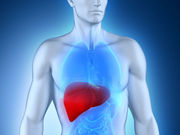Appears to delay disease progression and increase post-transplantation survival
THURSDAY, Feb. 25, 2016 (HealthDay News) — Regular coffee consumption seems to delay disease progression in alcoholic liver disease (ALD) and primary sclerosing cholangitis (PSC) patients with end-stage liver disease (ESLD) and increase long-term survival following liver transplantation, according to a study published online Feb. 15 in the Journal of Gastroenterology and Hepatology.
Kilian Friedrich, M.D., from the University Hospital of Heidelberg in Germany, and colleagues assessed coffee consumption habits in 379 patients with ESLD awaiting liver transplantation and 260 patients after liver transplantation.
The researchers found that 195 patients with ESLD consumed coffee on a daily basis, while 184 patients did not. Actuarial survival was lessened (P = 0.041) in non-coffee drinkers (40.4 months) compared to coffee drinkers (54.9 months). The survival of patients with ALD (P = 0.020) and PSC (P = 0.017) was increased with coffee intake, but unaffected in patients with chronic viral hepatitis (P = 0.517) or other liver disease entities (P = 0.652). Coffee consumption of PSC and ALD patients remained as an independent risk factor (odds ratio, 1.94; P = 0.013) in multivariate analysis, along with Model for End-Stage Liver Disease score (odds ratio, 1.13; P = 0.000). Long-term survival was also improved in coffee drinkers following liver transplantation (61.8 months) versus non-drinkers (52.3 months; P = 0.001).
“Coffee consumption delayed disease progression in ALD and PSC patients with ESLD and increased long-term survival after liver transplantation,” the authors write.
Copyright © 2016 HealthDay. All rights reserved.








